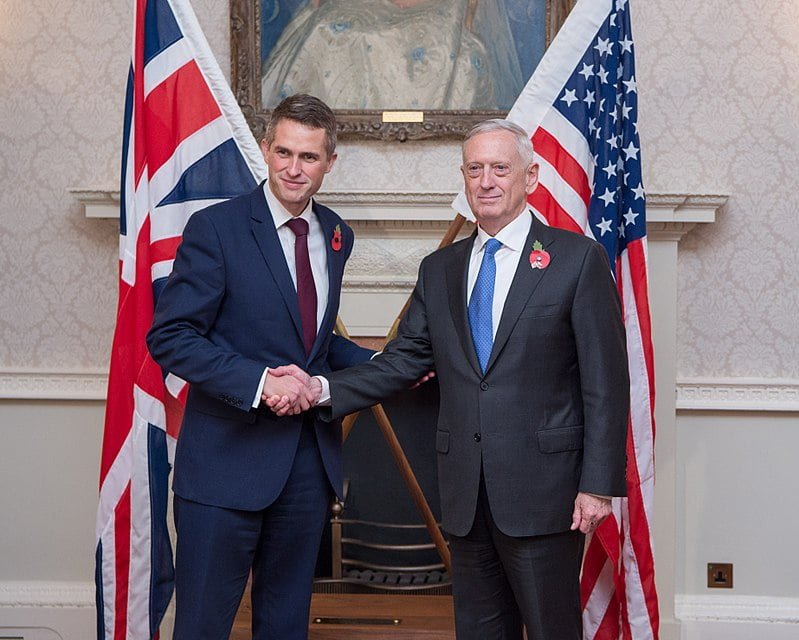With the world holding its breath as the crucial parliamentary election on Prime Minister Theresa May’s proposed Brexit-deal approaches, the British defense establishment appears preoccupied with crafting a more global posture for Britain’s military post-Brexit. At the end of December the British Minister of Defence Gavin Williamson claimed with enthusiasm that Brexit could augur in a new era for Britain as a “true global player once more.”
Stating that the exit from the European Union is the UK’s “biggest moment as a nation since the end of the Second World War”, Williamson portended a central role for the British Armed Forces in expanding Post-Brexit UK’s footprint on the international stage. The practical substance of this new presence will be the potential establishment of British military bases around the world, for a start in the Far East and the Caribbean. Whereas Williamson did not disclose any specific locations he hinted at the former British overseas territories of Singapore and Brunei in Asia, and Montserrat or Guyana in the Caribbean.
A British forward military presence in Asia would constitute a fundamental break with the 1960’s policy of withdrawal from territories “East of the Suez”, alluding to the consequences of the 1956 Suez Crisis, widely interpreted as the end of Britain’s status as a global superpower.
A New British Security Architecture
The legacy of the British Empire is widely visible in world geography. Besides a plethora of overseas territories, comprised mostly of remote island areas, the UK administers an extensive network of forward deployed military bases in key strategic areas around the world. In the majority of cases these are located in British overseas territories such as Gibraltar and Falkland’s, and even more conspicuously tied to the role of the military, the Sovereign Base Areas of Akrotiri and Dhekalia in Cyprus. The UK has also deployed troops in synchronicity with American forces as part of the global War on Terror in Afghanistan and Iraq.
But in the past couple of years, with the advent of Brexit, the UK has sought to extend its military footprint to areas previously abandoned by British forces, as part of a more active approach to sustaining British international influence.
As an example, the Independent reported on April 6 2018, that Britain had opened a permanent military base, the UK Naval Support Facility, in Mina Salman, Bahrain, containing a 500 man strong staff of personnel from all three branches of the armed forces. It is noticeably that the opening came 47 years after the relinquishment of its original HMS Juffair base in the wake of Bahraini independence. The main justification for the reestablished base is to guarantee that the vital sea-lanes of the Persian Gulf remain open, mainly in response to the threat posed to regional security by Iran.
Establishing new forward deployed bases in Singapore and Brunei would enhance Britain’s power projection capabilities to a degree unprecedented since the 1960’s withdrawal from East of the Suez. The push eastwards should also be observed as an initiative to forge closer ties to the U.S., at least on the defense and security front, in the wake of Brexit. A British military presence in the area around the South China Sea would lend vital support to American and regional efforts at countering Chinese attempts to assert its claims in region, which include a substantial part of the maritime exclusive economic zone of Brunei.
Mr. Williamson also stated that the UK should strengthen ties with states beyond the EU, mentioning Australia, Canada, New Zealand, states of the Caribbean, and states across Africa, foreshadowing that these would look to the “the moral leadership, the military leadership, and the global leadership” of the UK.
What about defence cooperation with the EU?
As one of the primary contributors to the collective European defense capacity, Britain’s exit from the Union will most probably force the EU into a period of introspection when it comes to the defense sector. According to The Spectator’s James Forsyth the UK has paradoxically risen in geopolitical magnitude with Brexit, as it largely coincides with the erratic fluctuations in U.S. President Donald Trump’s commitment towards NATO. The EU’s support for the UK in the wake of the Salisbury incident indicates that the Union does not harbor any intent to distance itself from the UK when it comes to the challenge posed by Russia to European security.
In Forsyth’s analysis the UK will become an even more efficient security partner to the EU without membership. The main impediment to a common European intervention force, spearheaded by France, has historically been the UK. Brexit obviously opens the opportunity for a collective European defense to take form, and as envisioned by the French leadership, to serve in contingencies beyond the EU itself.
The UK will also remove a key constraint to its foreign policy flexibility – the need for unanimity among EU members for a common approach in security matters. This is especially acute considering Russian attempts to undermine the EU’s cohesion by lending support to political right-wing factions and by coercing member-states reliant on Russian energy sources, precluding the possibility that these will agree to expand sanctions against Russia.
What form Britain’s Post-Brexit posture will take is still a matter of contention, but it is clear that the UK envisions a greater global presence by increasing its power projection.









